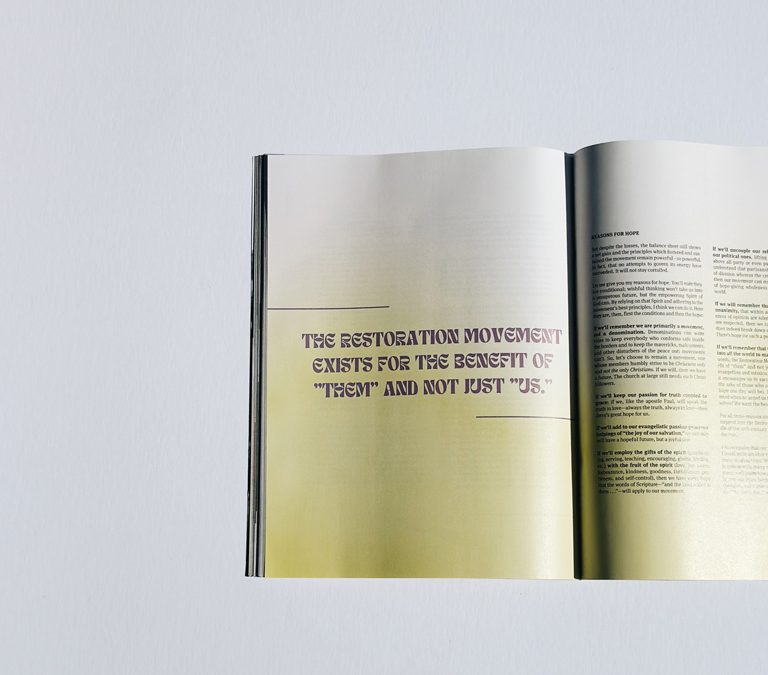In her book Developing Female Leaders, author and speaker Kadi Cole provides tools, coaching, and strategies for incorporating the development of female leaders into the leadership pipelines in our churches. After reading her book, I had the privilege to spend some time with her.
QUESTION: Why should church leaders invest in developing their female leaders?
KADI COLE: Young people have grown up in an age where diversity is the norm for them, so to walk into a worship experience and have everybody be very homogeneous is actually a deterrent. Not because they don’t agree with our beliefs, but because they can see that our beliefs aren’t actually impacting how we’re operating.
Generations Y and Z [people from about age 6 to 39] are especially sensitive to any sort of inauthenticity. Environments that are much more integrated . . . are the minimum standard that most of Gen Y and Z would have as a basis for any organization they want to be a part of, especially a church.
When did you start to realize other women in ministry leadership might be experiencing similar things that were limiting their ability to lead?
I was completely unaware of this until I did extensive research for the book. My motivation for writing the book was that I was working with male pastors in the multisite movement and they were running into blocks on their leadership development pipeline. It wasn’t about women breaking through barriers, they [the multisite pastors] just didn’t have enough leaders to fulfill their mission. As we analyzed that, we started finding that women weren’t accelerating through the pipeline at all the levels they could.
Once I started to realize sticky floor issues [such as] how women apply for jobs and what organizational gender bias looks like, I started to see [those issues] sprinkled throughout my leadership. A lot of my weaknesses are not about my gifting or capacity, they’re about resistance. [Before the research,] I didn’t know how to interpret my experiences. In that process of gaining awareness on my own journey, using that information to help male leaders do a better job with the females on their team, and seeing the transformation in a leadership culture, I realized we’re just operating out of ignorance.
We should help educate people so they can operate in truth and freedom. When we do that, when we understand that some of the decisions we make and the ways we approach things have unintended consequences, then we get better. When we know better, we do better, and the kingdom moves forward.
How can churches effectively assess the leadership potential of the women in their congregation?
Look at it the way you would look at [anyone’s] leadership potential. Every person in your congregation has been gifted by the Lord to contribute at high levels in your ministry. That’s why he brought them to your church. [T]hey have something to receive, but . . . they have something to give. If you have a very low percentage of women serving and leading in ministry, you have a lot of untapped potential. There are many gifts we use in leadership capacities in today’s ministry models—teaching, apostleship, administration. Of the women who are serving, what percentage of them are actually using those leadership gifts to contribute in a higher capacity?
Take a look at whatever onboarding system you have to help people use their spiritual gifts. If there’s no way to identify the gifting of the members of your church and help connect them into ministry roles, you’re leaving a lot of potential untapped.
You’ve said women who tend toward leadership often feel unfulfilled by traditional approaches to women’s ministry. Do you believe we are underleading and undertraining women?
As a whole, I think we’re underleading and undertraining everybody. That’s part of the challenge. [That’s] why we see so many men rise to leadership because of informal networks, not formal programs. Women who want to be used in ministry tend to jump into formal programs, but [those programs are] actually less effective than the informal networks that men have access to. That’s why we see such disparity.
The integration of spiritual formation programming with our leadership development processes is actually what everyone needs. Just as women are oftentimes “over-Bible-studied” and “under-leader-developed,” men tend to be “over-leader-focused” and “underdiscipled.” That’s why we have many . . . leaders who have lots of capacity [but they are] low in character [development] and spiritual formation. We see the results of that. There is inequity on both sides. That’s why integrating [these two things] and simply growing people is the number-one thing I think we can do for everyone.
How might a church clarify its stance on women in leadership?
I would address this like any other theological issue. Have the theological leaders of the church put together a system and a process to study God’s Word and to connect with other like-hearted churches to understand it. Because this is a secondary issue, there are many wonderful, godly, Bible-committed Christian leaders who think very differently about it. You have to acknowledge that the Bible is not clear on [this topic] and that it is controversial for a reason. You have to discern what God is calling your church to and what he is calling you to believe based on Scripture and the confirmation of the Holy Spirit.
Start by talking about it with your top-level leaders. This is a very personal topic. It is a theological issue about our view of God and how that plays out in who we are and how we are made in his image. We need to give people freedom to ask questions and give them time to think through the issue. When we have disagreement, we have to be able to handle that in a mature, godly way. (See sidebar, “Leading Men and Women in the Process.”)
What have you witnessed as churches have clarified their stances?
I’ve not seen any church or leader regret the process. Some churches are ready for this and in others [it] is a very heated topic. Cultural context makes a big difference in that. I think the readiness of the senior leaders and their own security makes a big difference in how welcome they are to people who are different from them. It requires male leaders to adjust how they lead. It’s a sacrifice they are making to see the kingdom move forward and to see their church be more of who she’s meant to be. It’s not a cheap sacrifice. It costs a lot personally. It costs a lot just in convenience, and I think in pride.
Many churches . . . are either making adjustments to their theological standing or they are making adjustments to their cultural application of their theology. Most cultures are way behind [their] churches’ theologies. I know several very conservative Baptist churches, who traditionally have strong limitations [on] women’s roles. However, I would say almost every Baptist church I’ve interacted with is realizing their culture is even more limiting than their theology. Because of that, they are making a lot of cultural shifts, even if they aren’t moving an inch on their theology. Their culture is what’s holding back women, not their theology.
What would you recommend to a church that’s trying to do a better job of empowering women?
I think the biggest issue is to actually take gender out of the conversation. I think we do a terrible job of articulating who we invite into leadership in general. I think the bigger play is about adjusting our leadership practices so they don’t create barriers to people who don’t fit the majority. Don’t just say, “Women can do this”; instead say, “Here’s what it takes to be a small group leader.” When we do this, we create more biblical, family-style dynamics for developing and placing people in leadership. In our biblically illiterate culture and [among our] unchurched population, we have to look for what qualifies you, not what disqualifies you.
I would also look at the weekend service. [I would ask questions like,] “Are we sending unintended messages with our weekend service because we never have women in leadership roles on the platform?” Or, “Can a woman only lead a song from the back of the stage, not from the front and center of the stage?” That communicates something to all the women in the room. We should reflect on and analyze unintended messages to our body in the most powerful, culture-communicating experience we have, which is our weekend worship service.
We get what we celebrate. [For example,] when we celebrate the 20-year-old intern with the skinny jeans and the cool haircut, we’re going to get more of that. When we celebrate someone who has been walking with the Lord faithfully for 20 years and tithes every week and loves his or her family well, we’re going to get people who aspire to that.
What can a leader do to create an environment for high-capacity women?
The number-one thing you can do is to ask high-capacity female leaders, “What’s it like to be a female leader here?” and then really listen to the answer.
If you can ask that question to 10 high-capacity female leaders—women who are really involved and women who are not involved, but who are successful and have great capacity—you are going to get a really good feel for the things holding women back.
How do you create a leadership environment and team-building moments that are more inclusive?
Part of the system that kept women out has made it really great for guys. For men, they get to go to work with guys they would be friends with. [Male leaders] tend to hire their friends and their brothers-in-law, so when they go to a conference, they’re basically creating a social experience for themselves where they combine work and pleasure.
For women, we don’t get to have a lot of friends at work because there aren’t a lot of women there. We have to use our private time [for social experiences]. We don’t get to access work as our friend base. I actually think this is part of the sacrifice men have to make. [In that sacrifice,] we’re all agreeing we will be friendly at work, but we won’t use work [as the center of] our entire social life. We’re [asking all staff to] make work and ministry a place where everyone is here for the kingdom.
Get your copy of Developing Female Leaders from Thomas Nelson, Inc. publishers.
– SIDEBAR –
Leading Men and Women in the Process
We must lead both men and women well in this process [of developing female leaders in the church]. Even if all you’re doing is reaffirming what you believe, it’s still important to give people space to process.
Men: We should help men have some space to go through the process and educate them about their role in the kingdom to empower and equip women.
Regardless of your theological view, we can pretty much all agree that we come from a culture that has miscommunicated the value and the contribution of women. We carry that with us into our faith and into our churches whether we want to or mean to or not. That becomes an important piece because most changes for women in their leadership opportunities hinge on midlevel managing men. [Positions like] the head of your usher’s team or the guy who coordinates the Sunday school classes in most churches.
Women: Not all women are excited about opening up doors for women to lead at higher levels. Women have spent a lot of time studying God’s Word, so they care deeply about the truth. They’ve been taught one thing and they’ve gone to the bank on it. You’re shaking the foundation of who they thought they were and how they’ve lived their lives in the kingdom.
Imagine a 60-year-old woman who has very strong leadership gifts who has been told her entire Christian life that the fruit of those giftings is sin. [Women of that age who have taken steps to lead have been told] “you’re loud,” “you talk too much,” “you command too much presence,” “you need a gentle and quiet spirit.” What level-five leader do you know who’s quiet and gentle in everything they do? Almost no one. But women have been communicated [this message] very consistently.
Women have been told their actual gifting from the Lord, which was meant to make an impact in the kingdom, has been wrong. They’ve been curtailing that for 40 years. [It] is a pretty big message to say, “Oh. Whoops. Sorry, that was actually wrong. We now want you to lead this entire team.” It challenges who they are, and it challenges how they stewarded their gift to impact the kingdom. [If] you want to steward their hearts, then position them to use their gifts in ministry—sometimes for the first time.
—K.H.





I am a 78 year old woman who is still in church leadership. I received my original training at LCU, but when I graduated in 1965, I was given the message that there was no place for me in leadership even in Christian Education, which was one of my majors.
When women are given this message over & over, they often make decisions that means that the church in which they grew up & were trained doesn’t want them. I felt at times that our colleges trained women in hopes they would marry a pastor, so the church would get 2 for the salary of one. Even while attending LCU, I got the message that the only women who mattered & who might be accepted in leadership were those who could sing. It was OK to sing a message, but not OK to speak the same message. A student with great gifts of music talked with me in a casual conversation that convinced me that I just had other gifts. This changed my perspective & I think she planted some seeds in the minds of those who chose teams to travel from the school on weekends, so in my last 2 years at LCU, I was able to use some of my gifts. However, it didn’t carry over to the attitude of the churches after graduation. I spent 2 years in leadership ministry in missions & found that as long as churches in the US didn’t have to change, it was OK for women to use their leadership gifts in another country. Inadvertently, the message was that it was OK to use my leadership in a way that doesn’t require changes at home or in a secular profession, but not in the church in the US. I came home & pursued further education which allowed me to teach in higher education.
Partially because of these messages & partially because of the churches in the community to which I moved for a position at a university, I ended up in a church that was more open to women in leadership. My leadership is now more local because of the transitions of age, however I occasionally do supply preaching for churches without a pastor or lead retreats.
Having taught in a university & therefore spent much time with various generations of young people and being a part of various Christian based Facebook groups, some for women who lead in the church, outcomes tend to be different than mine. Those who are younger & who face these issues tend to move away from the church, at least for a time & unfortunately some for a lifetime. Some come back, but usually find a church that is more open to women in leadership. I spent a short time in semi-withdrawal. In the community in which I taught, I had to choose a different church or go to church out of town. I decided to attend the church that I’m now a part of with the idea of being a pew sitter that doesn’t get involved. I was hurt by the church of my youth & training & had to take a bit of a Sabbatical from participation. Because this church was faithful to the gospel message & open & welcoming to the leadership gifts of women, the transition didn’t take long.
I appreciate this article & pray that the Holy Spirit will lead you, open the churches & men in leadership to the leadership gifts of women. I do occasionally attend the church in Springfield, IL, where I grew up & have seen some positive examples of women in leadership. However, I’m not there often, so there is probably more happening than what I see during worship. Thank you for,the opportunity to share the path God,has taken me in spiritual growth & leadership.
An old adage: When something gets done, is it by the men who talk about it OR the women who do it? In our local congregation there much discussion regarding single men, divorced people and what roles are women to fill. We are trying to better prepare and educate the whole congregation on who can work at the different leadership levels and minister in different functional areas. It is my firm belief that women are more valuable as a person and more accepted in doing ministry within the Christian Faith than any other world religion or non-belief system.
Thank God for the blessings that women are to His Creation.
The Bible is always clear. It is our understanding that’s not.